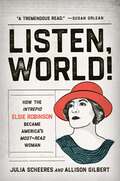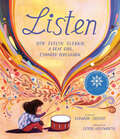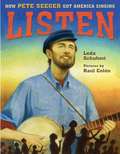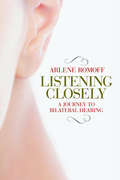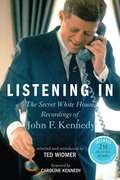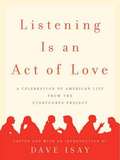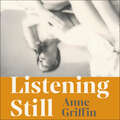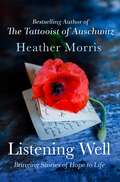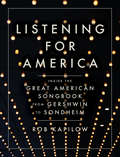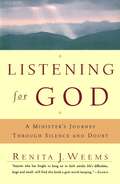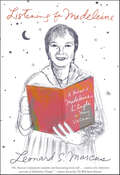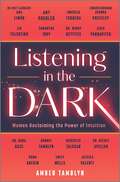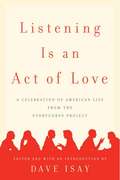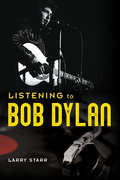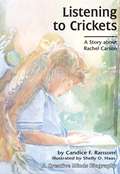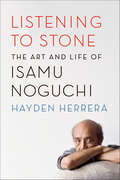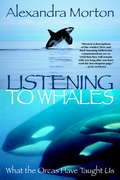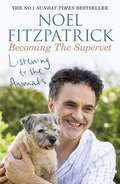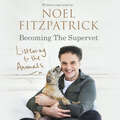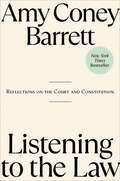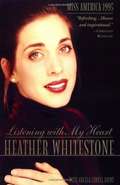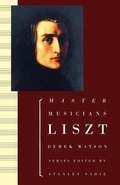- Table View
- List View
Listen, Vienna: The Life of St. Clement Mary Hofbauer
by James J. GalvinIn many ways this book gives an old history of Germany, France,and Russia during the 18th century. It is a story of deep commitment, lasting faith, and the resilience of the spirit in times of great oppression.
Listen, World!: How the Intrepid Elsie Robinson Became America's Most-Read Woman
by Julia Scheeres Allison Gilbert*Winner of the 2023 Northern California Book Award* The first biography of Elsie Robinson, the most influential newspaper columnist you&’ve never heard of At thirty-five, Elsie Robinson feared she&’d lost it all. Reeling from a scandalous divorce in 1917, she had no means to support herself and her chronically ill son. She dreamed of becoming a writer and was willing to sacrifice everything for this goal, even swinging a pickax in a gold mine to pay the bills. When the mine shut down, she moved to the Bay Area. Armed with moxie and samples of her work, she barged into the offices of the Oakland Tribune and was hired on the spot. She went on to become a nationally syndicated columnist and household name whose column ran for over thirty years and garnered more than twenty million readers. Told in cinematic detail by bestselling author Julia Scheeres and award-winning journalist Allison Gilbert, Listen, World! is the inspiring story of a timeless maverick, capturing what it means to take a gamble on self-fulfillment and find freedom along the way.
Listen: How Evelyn Glennie, a Deaf Girl, Changed Percussion
by Shannon StockerA gorgeous and empowering picture book biography about Evelyn Glennie, a deaf woman, who became the first full-time solo percussionist in the world. <p><p>"No. You can't," people said. But Evelyn knew she could. She had found her own way to listen. From the moment Evelyn Glennie heard her first note, music held her heart. She played the piano by ear at age eight, and the clarinet by age ten. But soon, the nerves in her ears began to deteriorate, and Evelyn was told that, as a deaf girl, she could never be a musician. What sounds Evelyn couldn’t hear with her ears, though, she could feel resonate through her body as if she, herself, were a drum. And the music she created was extraordinary. Evelyn Glennie had learned how to listen in a new way. And soon, the world was listening too. <P><P><i>Advisory: Bookshare has learned that this book offers only partial accessibility. We have kept it in the collection because it is useful for some of our members. Benetech is actively working on projects to improve accessibility issues such as these.</i>
Listen: How Pete Seeger Got America Singing
by Leda SchubertListen.There was nobody like Pete Seeger.Wherever he went, he got people singing. With his head thrown backand his Adam’s apple bouncing,picking his long-necked banjoor strumming his twelve-string guitar,Pete sang old songs,new songs,new words to old songs,and songs he made up.In this gorgeously written and illustrated tribute to legendary musician and activist Pete Seeger, author Leda Schubert highlights major musical events in Mr. Seeger's life as well important moments of his fight against social injustice. From singing sold-out concerts to courageously standing against the McCarthy-era finger-pointing, Pete Seeger's life is celebrated in this bold book for young readers with gorgeous illustrations by Raúl Colón.A Neal Porter BookThis title has Common Core connections.
Listening Closely: A Journey to Bilateral Hearing
by Arlene RomoffImagine what it would be like not to hear a sound--no music, no friendly voices, no children's laughter. Arlene Romoff doesn't have to imagine how it would feel: she lived it. Although she was born with normal hearing, in her late teens it began to slip away, as if someone were lowering the volume of the world around her. Over the next twenty-five years, Arlene began a long, slow descent into deafness so profound that no hearing aid or assistive device could help. The experience was devastating.But then Arlene opted for what she considers a miracle: She got a cochlear implant. Using electrodes threaded into the cochlea, an internal computer chip, and an external computer processor, cochlear implants bypass the damaged portion of the cochlea and stimulate the auditory nerve directly, allowing sound to reach the brain. Amazingly, she could hear again.Arlene's journey, however, isn't just about the magic of technology. What she endured reveals as much about the strength of the human spirit, about the wonders of chance and fate, and about making the most of what life dishes out. For Arlene, events seemed to unfold almost as if they were a part of some elaborate plan: just when she went deaf, her insurance company began paying for the implants. And ten years later, when her old cochlear implant finally failed she received new state-of-the-art technology and underwent yet another metamorphosis--one that helped her continue to counsel others in a similar situation.LISTENING CLOSELY will give you a chance to walk in Arlene Romoff's shoes, to understand the pain of her loss and the joy of once again being able to hear the music of the world. Those suffering from hearing loss--or who have loved one who is--will find Arlene's very special journey both inspirational and informative.
Listening In: The Secret White House Recordings of John F. Kennedy
by Ted WidmerIn July 1962, in an effort to preserve an accurate record of Presidential decision-making in a highly charged atmosphere of conflicting viewpoints, strategies and tactics, John F. Kennedy installed hidden recording systems in the Oval Office and in the Cabinet Room. The result is a priceless historical archive comprising some 265 hours of taped material. JFK was elected president when Civil Rights tensions were near the boiling point, and Americans feared a nuclear war. Confronted with complex dilemmas necessitating swift and unprecedented action, President Kennedy engaged in intense discussion and debate with his cabinet members and other advisors. Now, in conjunction with the fiftieth anniversary of the Kennedy presidency, the John F. Kennedy Library and historian Ted Widmer have carefully selected the most compelling and important of these remarkable recordings for release, fully restored and re-mastered onto two 75-minute CDs for the first time. Listening In represents a uniquely unscripted, insider account of a president and his cabinet grappling with the day-to-day business of the White House and guiding the nation through a hazardous era of uncertainty. Accompanied by extensively annotated transcripts of the recordings, and with a foreword by Caroline Kennedy, Listening In delivers the story behind the story in the unguarded words and voices of the decision-makers themselves. Listening In covers watershed events, including the Cuban Missile Crisis, the Space Race, Vietnam, and the arms race, and offers fascinating glimpses into the intellectual methodology of a circumspect president and his brilliant, eclectic brain trust. Just as the unique vision of President John F. Kennedy continues to resonate half a century after his stirring speeches and bold policy decisions, the documentary candor of Listening In imparts a vivid, breathtaking immediacy that will significantly expand our understanding of his time in office.
Listening Is an Act of Love: A Celebration of American Life from the StoryCorps Project
by Dave IsayFrom more than ten thousand interviews, StoryCorps-the largest oral history project in the nation's history-presents a tapestry of American stories, told by the people who lived them to the people they love. StoryCorps began with the idea that everyone has an important story to tell. And since 2003, this remarkable project has been collecting the stories of everyday Americans and preserving them for future generations. In New York City and in mobile recording booths traveling the country-from small towns to big cities, at Native American reservations and an Army post-StoryCorps is collecting the memories of Americans from all ages, backgrounds, and walks of life. The project represents a wondrous nationwide celebration of our shared humanity, capturing for posterity the stories that define us and bind us together. In Listening Is an Act of Love, StoryCorps founder and legendary radio producer Dave Isay selects some of the most remarkable stories from the already vast collection and arranges them thematically into a moving portrait of American life. The voices here connect us to real people and their lives-to their experiences of profound joy, sadness, courage and despair, to good times and hard times, to good deeds and misdeeds. To read this book is to be reminded of how rich and varied the American storybook truly is, how resistant to easy categorization or caricature. Above all, this book honors the gift each StoryCorps participant has made, from the raw material of his or her life, to the Americans who will come after. We are our history, individually and collectively, and Listening Is an Act of Love touchingly reminds us of this powerful truth.
Listening Still: The new novel by the bestselling author of When All is Said
by Anne GriffinThe new novel by the bestselling author of When All is Said.From the bestselling author of When All is Said comes a delicious new novel about a young woman who can hear the dead - a talent which is both a gift and a curse. Jeanie Masterson has a gift: she can hear the recently dead and give voice to their final wishes and revelations. Inherited from her father, this gift has enabled the family undertakers to flourish in their small Irish town. Yet she has always been uneasy about censoring some of the dead's last messages to the living. Unsure, too, about the choice she made when she left school seventeen years ago: to stay or leave for a new life in London with her charismatic teenage sweetheart. So when Jeanie's parents unexpectedly announce their plan to retire, she is jolted out of her limbo. In this captivating successor to her bestselling debut, Anne Griffin portrays a young woman who is torn between duty, a comfortable marriage and a role she both loves and hates and her last chance to break free, unaware she has not been alone in softening the truth for a long while.(P) 2021 Hodder & Stoughton Ltd
Listening Well: Bringing Stories of Hope to Life
by Heather MorrisFrom New York Times bestselling author Heather Morris comes the memoir of a life of listening to others.In Listening Well, Heather will explore her extraordinary talents as a listener—a skill she employed when she first met Lale Sokolov, the tattooist at Auschwitz-Birkenau and the inspiration for her bestselling novel. It was this ability that led Lale to entrust Heather with his story, which she told in her novel The Tattooist of Auschwitz and the bestselling follow up, Cilka's Journey.Now Heather shares the story behind her inspirational writing journey and the defining experiences of her life, including her profound friendship with Lale, and explores how she learned to really listen to the stories people told her—skills she believes we can all learn."Stories are what connect us and remind us that hope is always possible."—Heather Morris
Listening for America: Inside The Great American Songbook From Gershwin To Sondheim
by Rob Kapilow“Not since the late Leonard Bernstein has classical music had a combination salesman-teacher as irresistible as Kapilow.” —Kansas City Star Few people in recent memory have dedicated themselves as devotedly to the story of twentieth- century American music as Rob Kapilow, the composer, conductor, and host of the hit NPR music radio program, What Makes It Great? Now, in Listening for America, he turns his keen ear to the Great American Songbook, bringing many of our favorite classics to life through the songs and stories of eight of the twentieth century’s most treasured American composers—Kern, Porter, Gershwin, Arlen, Berlin, Rodgers, Bernstein, and Sondheim. Hardly confi ning himself to celebrating what makes these catchy melodies so unforgettable, Kapilow delves deeply into how issues of race, immigration, sexuality, and appropriation intertwine in masterpieces like Show Boat and West Side Story. A book not just about musical theater but about America itself, Listening for America is equally for the devotee, the singer, the music student, or for anyone intrigued by how popular music has shaped the larger culture, and promises to be the ideal gift book for years to come.
Listening for God: A Minister's Journey Through Silence and Doubt
by Renita J. WeemsA respected African-American woman preacher offers a stirring chronicle of her personal crisis of faith, giving prayers and meditations that can restore spiritual belief and showing how faith has a clear place in the day-to-day world. Reprint.
Listening for Madeleine: A Portrait of Madeleine L'Engle in Many Voices
by Leonard S. MarcusWriter. Matriarch. Mentor. Friend. Icon.Madeleine L'Engle is perhaps best recognized as the author of A Wrinkle in Time, the enduring milestone work of fantasy fiction that won the 1963 John Newbery Medal for excellence in children's literature and has enthralled millions of readers for the past fifty years. But to those who knew her well, L'Engle was much more besides: a larger-than-life persona, an inspiring mentor, a strong-willed matriarch, a spiritual guide, and a rare friend. In Listening for Madeleine, the renowned literary historian and biographer Leonard S. Marcus reveals Madeleine L'Engle in all her complexity, through a series of incisive interviews with the people who knew her most intimately. Vivid reminiscences of family members, colleagues, and friends create a kaleidoscope of keen insights and snapshop moments that help readers to understand the many sides of this singularly fascinating woman.
Listening in the Dark: Women Reclaiming the Power of Intuition
by Amber TamblynAmber Tamblyn, Jessica Valenti, Lidia Yuknavitch, Jia Tolentino, Samantha Irby, Meredith Talusan, Congresswoman Ayanna Pressley, Amy Poehler, America Ferrera, Ada Limón, and Huma Abedin are among the impressive list of authors contributing to this powerful collection of essays that takes a fresh and powerful look at our relationship to intuition and how we can harness it to change our everyday lives and the world. For generations, women have been taught to ignore their intuitive intelligence, whether in their personal lives or professional ones, in favor of making logical, evidence-based decisions. But what if that small voice or deeper knowing was our greatest gift, an untapped power we could use to affect positive change?Edited by award-winning author, activist, and actress Amber Tamblyn, Listening in the Dark is a compilation of some of today&’s most striking women visionaries across industries—in literature, science, art, education, medicine, and politics—who share their experiences engaging with their own inner wisdom in pivotal, crossroad moments.Filled with deeply personal and revelatory essays, Listening in the Dark will empower readers to reconnect with their own unique intuitive process, to see it as the precious resource it is, and to be unafraid to listen to all that it has to say and all that it has to offer.
Listening is an Act of Love: A Celebration of American Lives from the StoryCorps Project
by Dave IsaySelection of excerpts from oral history interviews from the StoryCorps Project which are also broadcast on NPR's "Morning Edition" every Friday.
Listening to Bob Dylan (Music in American Life)
by Larry StarrVenerated for his lyrics, Bob Dylan in fact is a songwriting musician with a unique mastery of merging his words with music and performance. Larry Starr cuts through pretention and myth to provide a refreshingly holistic appreciation of Dylan's music. Ranging from celebrated classics to less familiar compositions, Starr invites readers to reinvigorate their listening experiences by sharing his own—sometimes approaching a song from a fresh perspective, sometimes reeling in surprise at discoveries found in well-known favorites. Starr breaks down often-overlooked aspects of the works, from Dylan's many vocal styles to his evocative harmonica playing to his choices as a composer. The result is a guide that allows listeners to follow their own passionate love of music into hearing these songs—and personal favorites—in new ways. Reader-friendly and revealing, Listening to Bob Dylan encourages hardcore fans and Dylan-curious seekers alike to rediscover the music legend.
Listening to Crickets: A Story About Rachel Carson
by Candice F. RansomExamines the life of the marine biologist and science writer whose book "Silent Spring" changed the way we look at pesticides.
Listening to Stone: The Art and Life of Isamu Noguchi
by Hayden HerreraThroughout the twentieth century, Isamu Noguchi was a vital figure in modern art. From interlocking wooden sculptures to massive steel monuments to the elegant Akari lamps, Noguchi became a master of what he called the "sculpturing of space." But his constant struggle—as both an artist and a man—was to embrace his conflicted identity as the son of a single American woman and a famous yet reclusive Japanese father. "It's only in art," he insisted, "that it was ever possible for me to find any identity at all." In this remarkable biography of the elusive artist, Hayden Herrera observes this driving force of Noguchi's creativity as intimately tied to his deep appreciation of nature. As a boy in Japan, Noguchi would collect wild azaleas and blue mountain flowers for a little garden in front of his home. As Herrera writes, he also included a rock, "to give a feeling of weight and permanence." It was a sensual appreciation he never abandoned. When looking for stones in remote Japanese quarries for his zen-like Paris garden forty years later, he would spend hours actually listening to the stones, scrambling from one to another until he found one that "spoke to him." Constantly striving to "take the essence of nature and distill it," Noguchi moved from sculpture to furniture, and from playgrounds to sets for his friend the choreographer Martha Graham, and back again working in wood, iron, clay, steel, aluminum, and, of course, stone. Throughout his career, Noguchi traveled constantly, from New York to Paris to India to Japan, forever uprooting himself to reinvigorate what he called the "keen edge of originality." Wherever he went, his needy disposition and boyish charm drew women to him, yet he tended to push them away when things began to feel too settled. Only through his art—now seen as a powerful aesthetic link between the East and the West—did Noguchi ever seem to feel that he belonged.Combining the personal correspondence of and interviews with Noguchi and those closest to him—from artists, patrons, assistants, and lovers—Herrera has created an authoritative biography of one of the twentieth century's most important sculptors. She locates Noguchi in his friendships with such artists as Buckminster Fuller and Arshile Gorky, and in his affairs with women including Frida Kahlo and Anna Matta Clark. With the attention to detail and scholarship that made her biography of Gorky a finalist for the Pulitzer Prize, Herrera has written a rich meditation on art in a globalized milieu. Listening to Stone is a moving portrait of an artist compulsively driven to reinvent himself as he searched for his own "essence of sculpture."
Listening to Whales: What The Orcas Have Taught Us
by Alexandra MortonAlexandra Morton shares spellbinding stories about her career in whale and dolphin research and what she has learned from and about these magnificent mammals. In the late 1970s, while working at Marineland in California, Alexandra pioneered the recording of orca sounds by dropping a hydrophone into the tank of two killer whales. She recorded the varied language of mating, childbirth, and even grief after the birth of a stillborn calf. At the same time she made the startling observation that the whales were inventing wonderful synchronized movements, a behavior that was soon recognized as a defining characteristic of orca society. In 1984, Alexandra moved to a remote bay in British Columbia to continue her research with wild orcas. Her recordings of the whales have led her to a deeper understanding of the mystery of whale echolocation, the vocal communication that enables the mammals to find their way in the dark sea. A fascinating study of the profound communion between humans and whales, this book will open your eyes anew to the wonders of the natural world.
Listening to Whales: What the Orcas Have Taught Us
by Alexandra MortonIn Listening to Whales, Alexandra Morton shares spellbinding stories about her career in whale and dolphin research and what she has learned from and about these magnificent mammals. In the late 1970s, while working at Marineland in California, Alexandra pioneered the recording of orca sounds by dropping a hydrophone into the tank of two killer whales. She recorded the varied language of mating, childbirth, and even grief after the birth of a stillborn calf. At the same time she made the startling observation that the whales were inventing wonderful synchronized movements, a behavior that was soon recognized as a defining characteristic of orca society. In 1984, Alexandra moved to a remote bay in British Columbia to continue her research with wild orcas. Her recordings of the whales have led her to a deeper understanding of the mystery of whale echolocation, the vocal communication that enables the mammals to find their way in the dark sea. A fascinating study of the profound communion between humans and whales, this book will open your eyes anew to the wonders of the natural world.From the Trade Paperback edition.
Listening to the Animals: Becoming The Supervet
by Professor Noel FitzpatrickTHE NO.1 SUNDAY TIMES BESTSELLER. A powerful, heart-warming and inspiring memoir from the UK's most famous and beloved vet, Professor Noel Fitzpatrick - star of the Channel 4 series The Supervet.Growing up on the family farm in Ballyfin, Ireland, Noel's childhood was spent tending to the cattle and sheep, the hay and silage, the tractors and land, his beloved sheepdog Pirate providing solace from the bullies that plagued him at school. It was this bond with Pirate, and a fateful night spent desperately trying to save a newborn lamb, that inspired Noel to enter the world of veterinary science - and set him on the path to becoming The Supervet.Now, in this long-awaited memoir, Noel recounts this often-surprising journey that sees him leaving behind a farm animal practice in rural Ireland to set up Fitzpatrick Referrals in Surrey, one of the most advanced small animal specialist centres in the world. We meet the animals that paved the way, from calving cows and corralling bullocks to talkative parrots and bionic cats and dogs. Noel has listened to the many lessons that the animals in his care have taught him, and especially the times he has shared with his beloved Keira, the scruffy Border Terrier who has been by Noel's side as he's dealt with the unbelievable highs and crushing lows of his extraordinary career. As heart-warming and life-affirming as the TV show with which he made his name, Listening to the Animals is a story of love, hope and compassion, and about rejoicing in the bond between humans and animals that makes us the very best we can be.
Listening to the Animals: Becoming The Supervet
by Professor Noel FitzpatrickTHE MASSIVE NO.1 SUNDAY TIMES BESTSELLERIn this inspiring, uplifting and heart-warming memoir, world-renowned veterinary surgeon Professor Noel Fitzpatrick explores his journey to becoming The Supervet. Growing up on the family farm in Ballyfin, Ireland, Noel's childhood was spent tending to the cattle and sheep, the hay and silage, the tractors and land, his beloved sheepdog Pirate providing solace from the bullies that plagued him at school. It was this bond with Pirate, and a fateful night spent desperately trying to save a newborn lamb, that inspired Noel to enter the world of veterinary science - and set him on the path to becoming The Supervet.Now, in this long-awaited memoir, Noel recounts this often-surprising journey that sees him leaving behind a farm animal practice in rural Ireland to set up Fitzpatrick Referrals in Surrey, one of the most advanced small animal specialist centres in the world. We meet the animals that paved the way, from calving cows and corralling bullocks to talkative parrots and bionic cats and dogs. Noel has listened to the many lessons that the animals in his care have taught him, and especially the times he has shared with his beloved Keira, the scruffy Border Terrier who has been by Noel's side as he's dealt with the unbelievable highs and crushing lows of his extraordinary career. As heart-warming and life-affirming as the TV show with which he made his name, Listening to the Animals is a story of love, hope and compassion, and about rejoicing in the bond between humans and animals that makes us the very best we can be.Written and read by Noel Fitzpatrick(p) Orion Publishing Group 2018
Listening to the Law: Reflections on the Court and Constitution
by Amy Coney BarrettFrom Supreme Court Justice Amy Coney Barrett, a glimpse of her journey to the Court and an account of her approach to the Constitution. <P><P> Since her confirmation hearing, Americans have peppered Justice Amy Coney Barrett with questions. How has she adjusted to the Court? What is it like to be a Supreme Court justice with school-age children? Do the justices get along? What does her normal day look like? How does the Court get its cases? How does it decide them? How does she decide? <P><P> In Listening to the Law, Justice Barrett answers these questions and more. She lays out her role (and daily life) as a justice, touching on everything from her deliberation process to dealing with media scrutiny. With the warmth and clarity that made her a popular law professor, she brings to life the making of the Constitution and explains her approach to interpreting its text. Whether sharing stories of clerking for Justice Scalia or walking readers through prominent cases, she invites readers to wrestle with originalism and to embrace the rich heritage of our Constitution. <P><P> <B>New York Times Bestseller</B>
Listening with My Heart
by Angela Elwell Hunt Heather Whitestone<P>Heather Whitestone. Her name has become synonymous with incredible determination and unprecedented achievement. In Listening with My Heart, Heather tells her own story and the stories of others who have inspired her, proving that with hard work, perseverance, and faith, each of us can move mountains. <P>Profoundly deaf since she was eighteen months old, Heather strove to live a normal life, and refused to listen to the voices of discouragement that many of us so often hear, no matter what problems confront us. She wouldn't listen to the doctor who said she wouldn't develop beyond third-grade abilities, or to those who said she would never dance ballet, or even speak. She did, however, hear the encouraging spirit of her family and followed the guidance of her own heart's dreams. <P>Struggling through her difficulties, she was sustained by every success--no matter how small--and ultimately became Miss America 1995. Though she is disabled, her incredible gifts have inspired many throughout the world, and in Listening with My Heart she at last shares her life-changing wisdom.
Liszt
by Derek WatsonA very carefully researched and written account of the life, times, work and influence of Franz Liszt (1811-1886), who was from every point of view the most complex of men, an awesome constellation of restless contradictions. Contains many musical illustrations and references to a vast literature, also a cleverly organized and usefully detailed calendar and an exhaustive list of Liszt's works in diverse forms. Absorbing as bedtime reading material, but valuable also as a scholarly resource. Nicely produced, with several pages of photographic material.
Liszt
by Sacheverell SitwellBiography of the famous composer, a man of extraordinary magnetism and a pianist of unsurpassed virtuosity. Bibliography and a catalog of Liszt's works included.

